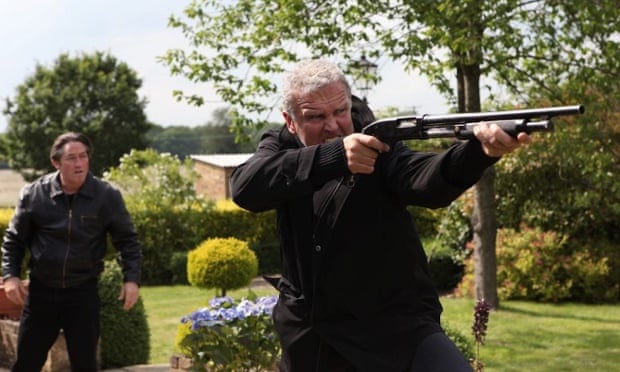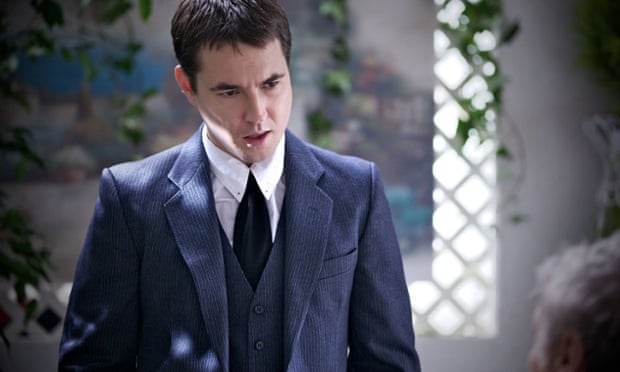Darren, sales manager at a plastics firm in
Milton Keynes, is a force to be reckoned with in the British film industry. In
part, he’s the reason why British crime cinema – low-budget, morally dubious and
about as disreputable as it’s ever been – is the genre that refuses to die. At
least, Darren would if he actually existed. Darren, it turns out, is a
theoretical construct; an audience archetype identified by Jezz Vernon, managing
director of distribution outfit Metrodome, the people who released recent
examples of the form such as The Guvnors, St George’s Day and The Fall of the
Essex Boys.
“We always talk about
the buyer of a film,” says Vernon. “For someone like Darren, there’s a certain
boredom about his existence, and the attraction to gangsters or football
hooligans has a certain aspirational element to it. It might sound worrying, but
we liken it to music: the mainstream in UK music has always liked poetic thugs,
from Byron to Liam Gallagher. People like the paradox; both the masculinity of
it, and the denial of it.”
These are the films
about top boys and bent cops, where blaggers are tooled up and hard men mugged
off. Poster artwork invariably spotlights major-league violence: either a
massive ruck, or heavy weaponry, or both. Largely London-based – and more
specifically, the eastern half of the capital, stretching out to the Essex
suburbs, they are suffused with suppressed rage and a fierce commitment to clan
honour. Vernon points out that the hooligan movie is, as a micro-genre, distinct
from the gangster movie, but they are connected by “very tribal, geographically
based consenting violence between two opposing groups”. Many films, however,
force a connection between the two, with the likes of The Rise and Fall of a
White Collar Hooligan making a direct link between football terrace shit-kickery
and large scale organised crime. The auteurs of this world are people such as
Nick Love and Julian Gilbey; it nourishes its own acting stable with the likes
of Frank Harper, Alan Ford and Craig Fairbrass.
The existence of a
solid, hardcore audience who keep watching means that, on some level, this is a
self-perpetuating, self-funding sector; evidence in its rawest form that a
British film industry does indeed exist. They don’t get anywhere near
state-disbursed funding, and nor, you suspect, would they want to. In some
cases, the figures are staggering: two of the original hooligan films, Green
Street and The Football Factory, sold well over a million DVDs each, while The
Business, the 80s-set Costa del Crime saga that shot Danny Dyer to fame in 2005,
shifted more than 800,000. Not every film can achieve that, and Vernon says that
DVD sales have declined rapidly in the past year or two; but even a small-scale
release, such as the Glasgow-set The Wee Man, can muster 100,000.
That makes the
economics of the low-budget crime movie attractive even if, as Vernon is the
first to admit, “they don’t export well”. The culturally specific argot, the
narrowly British concern with football, and the genre’s fascination with certain
key crimes – notably the notorious Rettendon murders in 1995 – mean that unlike
other areas of the British film industry, little concession is made to what
overseas audiences, particularly in the US, will make of it all.
Quite why the
Rettendon murders, in which three drug dealers were found shot dead in a Range
Rover in a small village near Chelmsford, exerts such a grip on film-makers’
imaginations is bit of a puzzle: by Vernon’s count, eight films have been made
about it, including Essex Boys, Rise of the Footsoldier, Fall of the Essex Boys
and Bonded by Blood. Other “clusters” in the genre include the recent tweak in
which older-generation hoolies and hard men scrap with hoodie-wearing
youngsters, a clash-of-subcultures hybrid amplified in The Guvnors and We Still
Kill the Old Way.
But what distinguishes
these films from the cheap-and-cheerful thrillers of earlier, hokier eras is the
sense that, somehow, they bear the imprint of the real thing. Authenticity is
the watchword; the current flood of films was anticipated by, and to a large
extent based on memoirs published by a media-literate generation of lawbreakers,
anxious to secure what Vernon refers to their “legacy”. It is a central irony
that the trigger for it all, the door-opener if you like, was the arrival in the
late 90s and early 2000s of “mockney” films such as Lock Stock & Two Smoking
Barrels and Love Honour and Obey, in which Primrose Hill types rubbed shoulders
with proper hard-men such as Lenny McLean. Since then, the films have, in
general, got more dour, nastier, and more self-justifying, if equally
celebratory.

A key player in all
this is Cass Pennant, a former member of West Ham’s infamous Inter City Firm,
who turned his dramatic life story into, first, a memoir – called Cass – and
then a film, also called Cass, released in 2008. Now 57, and still a physically
imposing figure, Pennant is set up as a film producer, operating from a room
above a pub just off Great Portland Street in London’s West End. Pennant’s
credibility with what he calls “the in-crowd” (not, it’s safe to say, the
bearded asymmetrical haircut types) means he is regularly called on as an on-set
consultant, as well as to act as a negotiator between film-makers and the
hard-men they want to involve in their movies.
Pennant says his
film-making activities go all the way back to The Firm, Alan Clarke’s
ground-breaking hooligan film starring Gary Oldman, for which he acted as an
uncredited adviser. But his real reverence, and acknowledgement of a foot in the
film-making door, is reserved for documentary-maker Ian Stuttard. Pennant says
Stuttard agreed to spend a year gaining the gang’s trust before they allowed him
to complete the now-seminal Hooligan in 1985. (“He got footage no one could ever
dream of getting.”) Pennant got his first taste of film-making by demanding a
seat in the editing room (“certain faces couldn’t be seen”). On the back of his
book success – and eight subsequent titles, including Top Boys: True Stories of
Football’s Hardest Men and 30 Years of Hurt: A History of England’s Hooligan
Army – Pennant first set up a publishing imprint and then began trying to
interest the film industry in his stories. He had a brush with Guy Ritchie
(Pennant and his co-writer Neil Bowers sued Ritchie over contributions to the
script for Snatch, and settled out of court), before getting Cass off the ground
and a credit as co-producer.
He invested a lot of
effort in The Guvnors, easing the way for a scene that featured a gathering of
former streetfighters: to the uninitiated, it looks like a group of ordinary
middle-aged men watching a football game, but in fact they are veteran top boys
from Hartlepool, Nottingham, Birmingham, and of course, West Ham. Twenty years
ago there would be no chance of them being in the same room without chairs
flying, but these days passions are somewhat spent. Even so, Pennant still has
to phone ahead to warn “a city” he is coming up for a meeting.
Pennant, and
presumably his in-crowd compadres, sees the films as a way of preserving the
values and reinforcing the mythology of a certain era – “respect” is a word that
still gets bandied around a lot– but, interestingly, for him race is not a
foreground issue. He is much more concerned with the class barriers that, in his
view, corral the film industry for the well off. “Film is purely owned by the
middle classes. Only the middle classes can make the films, but they can’t have
those lives. They belong to the working classes. The stories belong to the East
End. It’s like a marriage.”
The 50 or so titles
that Pennant issued as a publisher – a considerable chunk of which are other
hardman testimonies – now act as leverage for Pennant’s move into production.
His company, called Urban Edge (Stuttard is his partner) released its first
effort in 2011. Not unsurprisingly, it was a youth-culture documentary called
Casuals, which played to Pennant’s two main strengths: 80s street fashion and
football violence. He does, however, have bigger ideas: emphasising that Cass
was as much about “identity” as violence, he is planning a film about the 2Tone
movement, through the story of a mixed-race girl who, oddly enough, ended up
running with a terrace gang.
Could this be an
indication that the British crime thriller is running out of legs – or, at
least, is looking to adapt to survive? Other recent examples – such as the
Andrew Hulme-directed Snow in Paradise – have tried to recalibrate it, by
introducing more spiritual elements and calling attention to the genre’s
not-entirely-invisible racism. This week, another low-budget number, Hackney’s
Finest, aims to do a Tarantino on the British drugs thriller – again, based on
real life material. (The writer, Thorin Seex, was discovered by director Chris
Bouchard in his mum’s writing group.) In some ways, Hackney’s Finest is the
absolute opposite to the likes of Cass; Bouchard’s background as a VFX artist at
the Framestore effects house means the film has a surface flash few others could
manage, and the film has a bloodsoaked, black-comic tone that is fundamentally
unserious. (Plus Bouchard is an unlikely figure to be trying this sort of
hyperviolent, gun-infested malarkey: a soft-spoken type, he’s best known for the
Tolkien fan film The Hunt for Gollum, which went viral in 2009.)
But there is a
connection there: the hard-men thrillers that Pennant promotes, and Vernon
sells, are fan films themselves, in a way. The intimate relationships between
the subjects and participants, mean they operate as both description and
fantasy: they both simultaneously criticise and glamorise – which you suspect,
deep down, is the way Darren likes it.
Hackney’s Finest
is on release from today.

